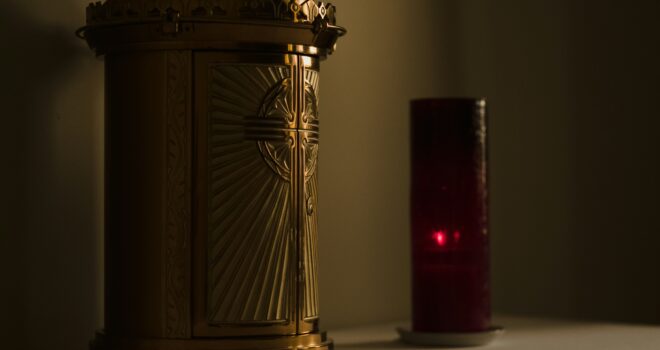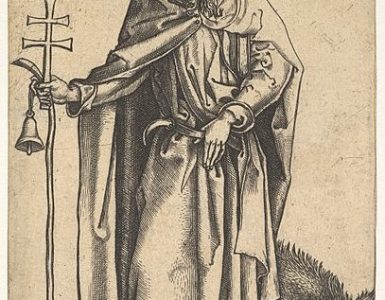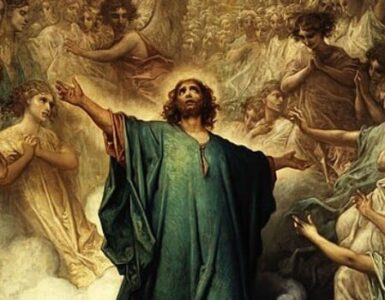Few Catholics have ever pondered what Jesus does all day in the Holy Eucharist. Besides waiting for us to visit Him, He is on fire with love for His Heavenly Father. St. Peter Julian Eymard, “the Apostle of the Holy Eucharist,” provides incredible insights into Jesus’ Eucharistic Interior Life with these words:
In the Most Blessed Sacrament, Jesus lives an entirely interior life. His life is a perpetual homage of Himself to the love and the glory of His Father, Whose perfections His human soul contemplates. In His sacramental state, Jesus continues the virtues of self-abasement of His mortal life, the humility that led Him to lower Himself unto the form of a slave; here He humbles Himself unto the form of bread, He unites Himself to the appearance of being, He reaches the last limit of nothingness.1
In the Eucharist, Jesus continues His life of prayer; much more, prayer becomes the one occupation of His soul. Jesus contemplates His Father, His greatness and His goodness. He adores Him by His profound abasement, which He associates with His state of glory. He thanks Him unceasingly for His gifts and kindness to man. He implores the grace of divine mercy and patience for sinners. He begs continually the charity of the Heavenly Father for the redeemed of the Cross.2
This veiled state gives most glory to the Heavenly Father, for Jesus thus renews and glorifies all the conditions of His mortal life. What He cannot do in the glory of heaven, He does by His state of annihilation on the altar. What loving looks the Heavenly Father casts upon earth, where He beholds His Son, whom He loves as Himself, in a state of poverty, humility, and obedience.
Our Lord has found the means of perpetuating and incessantly renewing the sacrifice of Calvary. He desires that His Father should have constantly under His eyes the heroic act by which He renders Him infinite glory, by immolating Himself for the destruction of the reign of Satan, His enemy.
Jesus Christ still continues to subject pride to the struggle that conquers it. As nothing is so hateful to God as pride, so nothing glorifies Him so much as humility. The glory of His Father is the first reason for Jesus’ hidden state in the Eucharist.3
One of the most amazing and forgotten Eucharistic realities is this: “Jesus contemplates His Father.” There in your nearby Catholic Church, Jesus is glorifying the Father from the Most Blessed Sacrament just as He did on earth. How incredible! Our Eucharistic Lord lives a life of unceasing gratitude and praise to the Father. Jesus’ Eucharistic Heart beats for His Father.
As we gaze upon the Blessed Sacrament, do we realize the depths of Jesus’ love for the Father? Our Lord forgets Himself entirely and abases Himself to the “limit of nothingness.” As we contemplate the Holy Eucharist, we must not only see Jesus, but also the Father, whom He is glorifying through the Holy Spirit.
And the Father, seeing His Eucharistic Son so obedient, so poor, and so humble, calls out from Heaven, “This is my beloved Son, with whom I am well pleased; listen to him” (Matt. 17:5). One could argue that Jesus glorifies the Father more in His Eucharistic abasement—because He is reduced to almost nothing—than in His glorified state in Heaven. In the Holy Eucharist, Calvary is perpetuated where Jesus remains mystically on the Cross, glorifying the Father.
Do you also realize that Jesus’ sole occupation in the Holy Eucharist is one of prayer, even more so than in His mortal life (according to St. Peter Julian Eymard)? On earth, Jesus had many missions, including teaching, preaching, and healing, but in the Holy Eucharist, Jesus’ sole mission is that of prayer. If we draw near to His Eucharistic Presence, Jesus will teach us the secrets of His Heart and the secrets of contemplation, for He is the Master of the Interior Life. To become like Jesus, the par exemplar of prayer, our interior life must be the foundation of our exterior life. We must seek to forget ourselves and pray with deep gratitude, praise, and intercession by entering Jesus’ contemplation of the Father. Prayer ought to be our greatest mission. We must never lose sight of our nothingness before the majesty of God. Above all, we must lose ourselves in the splendor of God’s glory, goodness, greatness, and mercy found in the Holy Eucharist, which is already a participation in Heaven.
Besides glorifying the Father, our Eucharistic Lord “implores the grace of divine mercy and patience for sinners. He begs continually the charity of the Heavenly Father for the redeemed of the Cross.” His Eucharist Heart beats for sinners as He relentlessly pursues us at every moment by offering the merits of His Passion and Death to the Father. Truly, the tabernacle is the throne of Divine Mercy. And Our Lord invites us to pray for the conversion of sinners.
There is another important lesson. We give the Father the greatest glory when we resemble His Son in the Holy Eucharist. “For you have died, and your life is hidden with Christ in God” (Col. 3:3). Our Lord spent thirty years, the bulk of his life, hidden from the eyes of man to reveal to us the necessity of the interior life and the necessity of becoming small. And now, until the end of time, Our Lord remains hidden in the Holy Eucharist. While pride tells us we should be great and noticed by man, our Eucharistic Lord reminds us that we must become little and forgotten by others, known to the Father alone. Yes, Jesus wants us to glorify the Father rather than to be glorified by man by following the path of the interior life.
Photo by Josh Applegate on Unsplash
1St. Peter Julian Eymard, Eucharistic Handbook (New York: The Sentinel Press, 1958), 126.
2St. Peter Julian Eymard, Eucharistic Handbook (New York: The Sentinel Press, 1958), 127.
3St. Peter Julian Eymard, The Real Presence (New York: Fathers of the Blessed Sacrament, 1907), 118-119.










